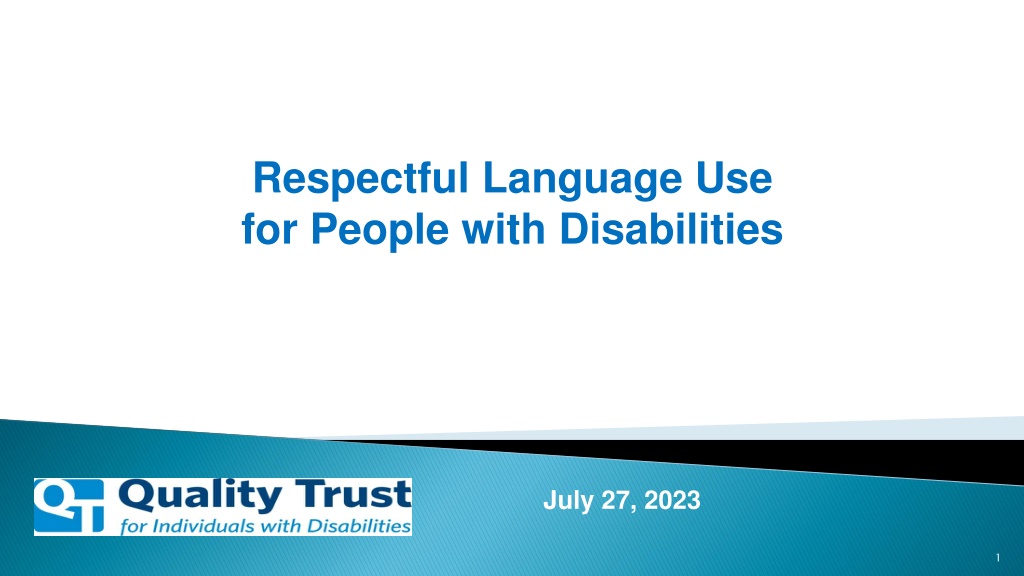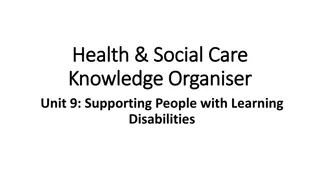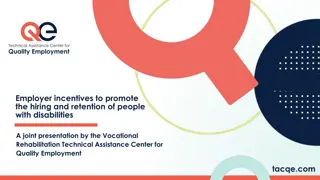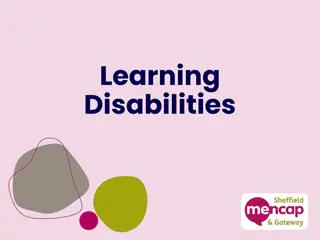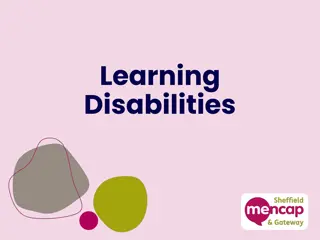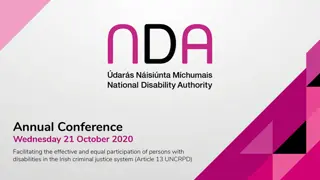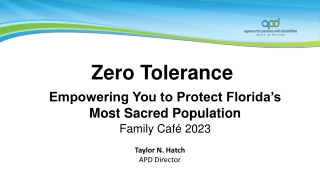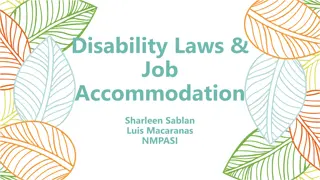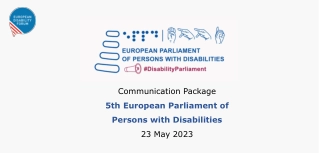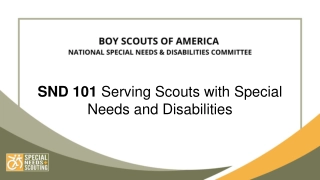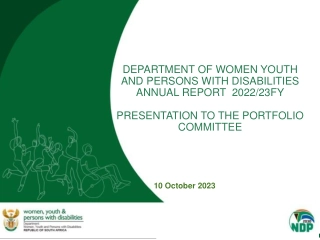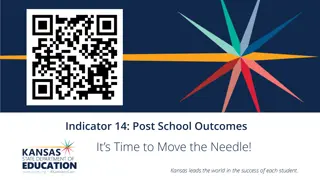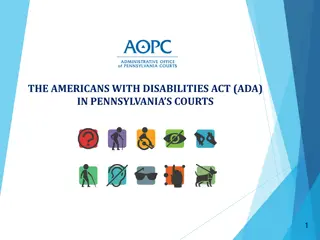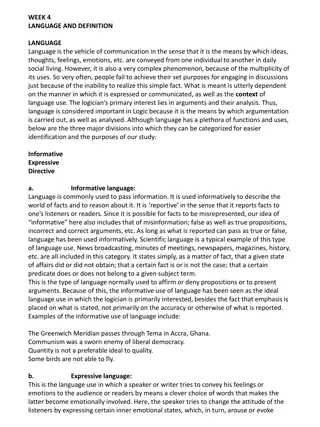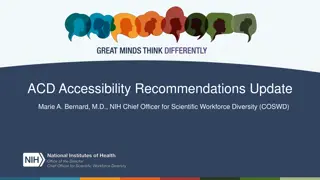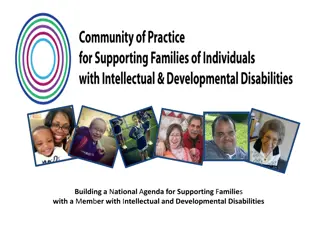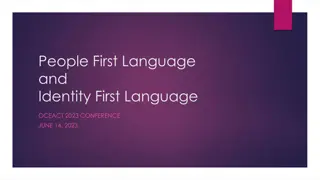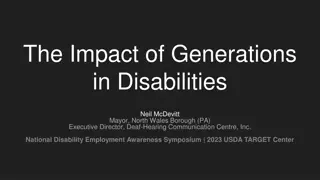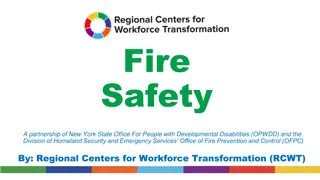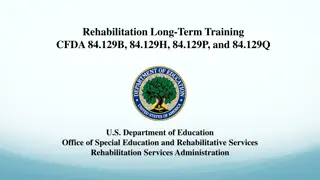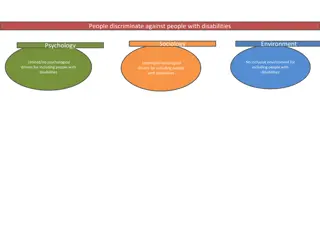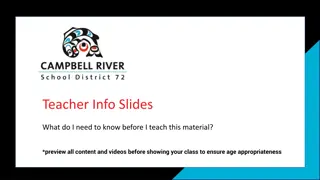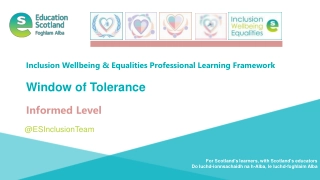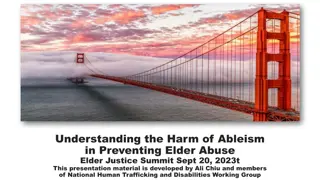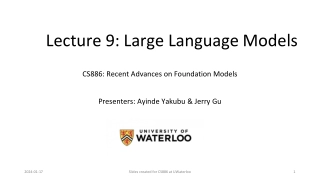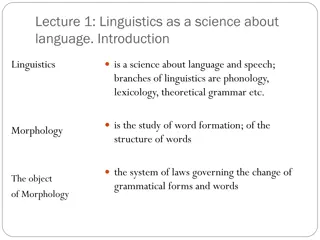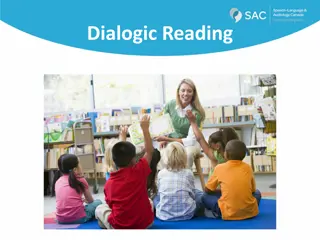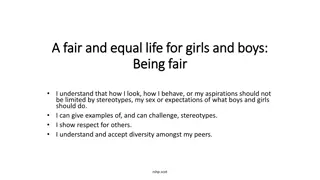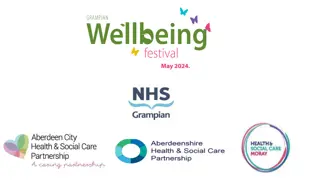Promoting Respectful Language Use for People with Disabilities
Explore the importance of respectful language when addressing individuals with disabilities, focusing on autonomy, dignity, and rights protection. Learn about disability rights movements, avoiding disability-based slurs, infantilizing language, and the impact of pity language. Discover alternative language to promote inclusivity and respect.
Download Presentation
Please find below an Image/Link to download the presentation.
The content on the website is provided AS IS for your information and personal use only. It may not be sold, licensed, or shared on other websites without obtaining consent from the author. Download presentation by click this link. If you encounter any issues during the download, it is possible that the publisher has removed the file from their server.
Presentation Transcript
Respectful Language Use for People with Disabilities July 27, 2023 1
Independent advocacy and monitoring Children and adults with disabilities Dignity, respect, and autonomy Rights protection and decision-making supports Jenny Hatch Justice Project (2013 to present) www.JennyHatchJusticeProject.org National Resource Center for Supported Decision-Making (2014 to present) www.SupportedDecisionMaking.org Family Ties of DC, parent to parent matching program 2
Brief History of Disability Rights Movements Historical attitudes to disability were paternalistic and charitable leading to segregation and loss of autonomy Disability rights movements challenged ideas of people with disabilities as helpless recipients of charity Notable disability rights movements include: Deaf Community: National Association of the Deaf founded 1880 Blind Community: National Federation of the Blind founded 1940 Physical Disability: Independent Living Movement and ADAPT, early 1970s Intellectual Disability Community: People First movement in the US since the 1970s Mad Pride/Psychiatric Survivors movement: Beginning 1970s Autistic Self Advocacy Community: 1990s-2000s
Disability-Based Slurs Includes language historically used to marginalize and dehumanize people with disabilities and justify our separation from broader society. Some of this language has an explicitly eugenic history. While some communities have reclaimed slurs, these should still not be used by people outside the community. Examples Alternatives R-word, Moron, Imbecile, Feeble-minded Crippled Insane, Crazy Intellectual disability Physically disabled Psychosocial disability
Infantilizing language Language that compares adults with disabilities to children, or that compares minors with disabilities to younger children with disabilities, denies us dignity. It also can lead to misleading assumptions that we don t have same needs for autonomy. Examples Alternatives Mental age of ____ Intellectual disability (with specific description of abilities and needs) Person Adult Caregiver Needs/uses supports Kiddo Child (when referring to adult) Caretaker Dependent on supports
Pity language and capacity-denying language People with disabilities typically do not want to be the objects of pity. Language that emphasizes what we can t do or portrays our access needs as problems is not preferred. Examples Alternatives Wheelchair bound Severely impaired Suffers from Incapacitated Wheelchair user Significant support needs Has/is diagnosed with Needs support for [insert activities], or does not have legal capacity to Nonspeaking/requiring communication supports Autism with intellectual disability/non-speaking autism/the following support needs Nonverbal Profound autism
Euphemistic Language Overly Euphemistic language is also not preferred. Euphemisms imply the unacceptability of disability and are also often harder for laypeople to understand. Most people with disabilities prefer direct but non-stigmatizing language Examples Alternatives Differently abled Special needs (note: may be still preferred by some parents) Handicapped The disabled Disability/disabled Disability/disabled, or needs xyz kinds of supports Disability/disabled People with disabilities
Identity-first versus Person-first Different Communities have different preferences regarding how to refer to disability including preferences regarding person-first language. Identity-first languagecan help emphasize the person s positive identification with the community and culture of the disability. Person-first languagecan be preferred to help emphasize a person s shared experience with those without disabilities. While the following recommendations represent some degree of community consensus, always follow people s individual preferences about how they want to be described!
Identity-first versus Person-First Language Preferences often vary by community and diagnosis but note that there is often still individual variation within these communities! I have I am Intellectual Disability/Developmental Disability Down Syndrome Epilepsy Cystic Fibrosis Cerebral Palsy Depression/Bipolar/Schizophrenia/Anxiety Disorder Access needs Psychosis (or experiencing psychosis ) Autistic Blind D/deaf Hard of Hearing Non-speaking A Little Person Dyslexic A trauma survivor A wheelchair user
